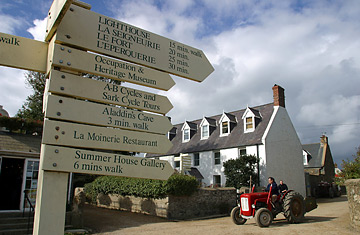
A crossroads on the island of Sark.
No monarchs were beheaded, but the upheaval on the tiny, weather-beaten English Channel island of Sark was nothing short of revolutionary. For 400 years, the 600-strong community, which has no paved roads, cars or streetlights, has remained Europe's last bastion of feudalism. A powerful overlord appointed the island's judiciary and gave his consent for each meeting of the government, a 52-seat parliament called the Chief Pleas, in which a majority of the seats was reserved for landowners.
That changed on Jan. 16, when the Chief Pleas passed a law mandating universal suffrage and ending the practice of reserving seats for the landed gentry. It also agreed to limit the role of the island's master, known in Sark's French-English patois as the Seigneur, and to make its constitution a democracy.
A historic event, perhaps, but not exactly 1789 all over again. What motivated the Chief Pleas was not the islanders' democratic fervor, but pressure from the European Court of Human Rights in Strasbourg. After protracted debate, Sark decided last year to add more elected seats to the legislature, but insisted that a certain number would still be reserved for landowners. In a recent poll, only 56% of Sarkese backed democracy.
On Jan. 13, however, British Lord Chancellor Jack Straw sent a letter to Sark demanding it move to full democracy, calling the proposed compromise inconsistent with "modern democratic principles." Sark is a dependent of the English monarchy, and its laws require approval by the British government.
The primary force for change has been reclusive billionaire twins, Sir Frederick and Sir David Barclay, who live in a castle on a private island within Sark's territorial waters. The brothers, who own London's Ritz hotel and the Daily Telegraph newspaper, have used the European Court of Human Rights to help overturn a local inheritance law requiring property to be left only to the oldest male heir and also the "treizième tax," which dedicated one-thirteenth of the sale price of property to the Seigneur.
The Barclays, through their lawyer Gordon Dawes, told TIME that their ultimate goal is democratic reform on Sark, but the pair is also in open conflict with the Seigneur, 80-year-old Michael Beaumont, whom Dawes calls a "dictator ruling through deference." Beaumont supports full democracy and has called for his powers to be diminished, but the Chief Pleas has resisted. The Seigneur remains a popular figure, whose family has governed the island since 1852.
The Barclays, meanwhile, have recently bought up as much as a fifth of the island, including three of its six hotels, raising fears in the tourism-reliant community that the pair are becoming overlords themselves.
Supporters of the status quo insist their system is fundamentally fair. "There are many places where the European Court of Human Rights and the United Nations could focus on promoting democracy rather than this small community that has not committed war or persecution, and has lived happily on its own for hundreds of years without any trouble," says Reginald Guille, the Chief Pleas' speaker of the house.
To portray Sark as a rural idyll untouched by modernity would be inaccurate, however. In the 1990s, British newspapers reported that up to 40% of Sark's inhabitants held directorships of companies. In a scheme dubbed the "Sark Lark", many residents sold their names or addresses to companies eager to take advantage of Sark's zero taxes and regulation-free environment. Sark is now regulated by a financial-services authority based on the nearby island of Guernsey.
"All I can say is that we do things differently," says landowner and Chief Pleas member Elisabeth Perrée, explaining why she opposes full democracy.
Clearly, she is not alone in her lack of enthusiasm. After its historic vote, the Chief Pleas did nothing to celebrate. It simply moved on to the next item on its agenda: Should electric bicycles be allowed on the island?
